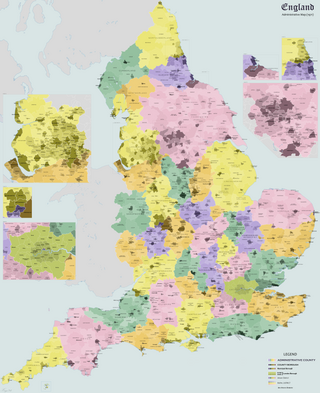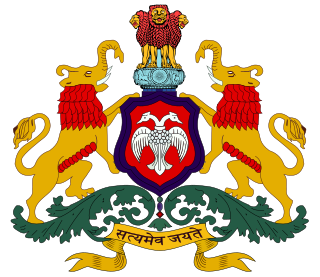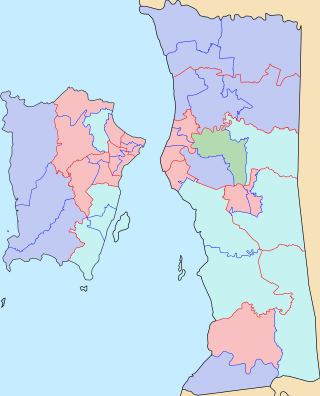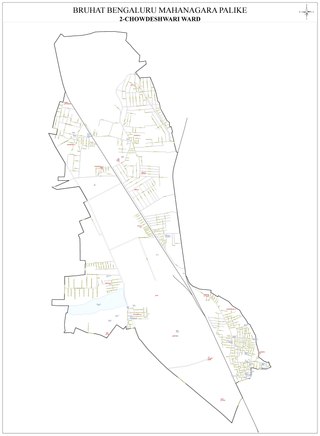Related Research Articles

The municipalities of Sweden are its lower-level local government entities. There are 290 municipalities which are responsible for a large proportion of local services, including schools, emergency services and physical planning.
An alderman is a member of a municipal assembly or council in many jurisdictions founded upon English law with similar officials existing in the Netherlands (wethouder) and Belgium (schepen). The term may be titular, denoting a high-ranking member of a borough or county council, a council member chosen by the elected members themselves rather than by popular vote, or a council member elected by voters.

A municipal borough was a type of local government district which existed in England and Wales between 1836 and 1974, in Northern Ireland from 1840 to 1973 and in the Republic of Ireland from 1840 to 2002. Broadly similar structures existed in Scotland from 1833 to 1975 with the reform of royal burghs and creation of police burghs.
Elections in the Philippines are of several types. The president, vice-president, and the senators are elected for a six-year term, while the members of the House of Representatives, governors, vice-governors, members of the Sangguniang Panlalawigan, mayors, vice-mayors, members of the Sangguniang Panlungsod/members of the Sangguniang Bayan, barangay officials, and the members of the Sangguniang Kabataan are elected to serve for a three-year term.

The City of Perth is a local government area and body, within the Perth metropolitan area, which is the capital of Western Australia. The local government is commonly known as Perth City Council. The City covers the Perth city centre and surrounding suburbs. The City covers an area of 20.01 square kilometres (8 sq mi) and had an estimated population of 21,092 as at 30 June 2015. On 1 July 2016 the City expanded, absorbing 1,247 residents from the City of Subiaco.
A municipal council is the legislative body of a municipality or local government area. Depending on the location and classification of the municipality it may be known as a city council, town council, town board, community council, rural council, village council, or board of aldermen.

The municipal government of Toronto is the local government responsible for administering the city of Toronto in the Canadian province of Ontario. Its structure and powers are set out in the City of Toronto Act.

The Government of Karnataka, abbreviated as GoK or GoKA, formerly known as Government of Mysore (1956–1974), is a democratically elected state body with the governor as the ceremonial head to govern the Southwest Indian state of Karnataka. The governor who is appointed for five years appoints the chief minister and on the advice of the chief minister appoints their council of ministers. Even though the governor remains the ceremonial head of the state, the day-to-day running of the government is taken care of by the chief minister and their council of ministers in whom a great amount of legislative powers are vested.
Local government in Canada can be defined as all elected local authorities which are legally empowered to make decisions on behalf of its electors, excluding the federal government, provincial and territorial governments, and First Nations, Métis and Inuit governments. This can include municipalities, school boards, health authorities, and so on.
The City Council of Singapore was the administrative council of the City of Singapore responsible for the provision of water, electricity, gas, roads and bridges and street lighting.

According to the Political Constitution of Costa Rica of 1949, in article 168, the territorial division of Costa Rica is organized by law into three types of subnational entity:

Pimpri Chinchwad Municipal Corporation (PCMC) is the civic body that governs Pimpri-Chinchwad which includes Pimpri, Akurdi, Chinchwad, Nigdi, and the remainder of the northwestern city limits of Pune, India. It was established on 11 October 1982. It governs an area of 181 km2 with a population of 1.72 million. The executive power of the PCMC is vested in the Municipal Commissioner, an Indian Administrative Service (IAS) officer appointed by the Government of Maharashtra. The position is held by Shekhar Singh (IAS) during the pandemic in late December 2020. The general body of the PCMC consists of 128 directly elected councilors, popularly known as "corporators", headed by a mayor. Rahul Jadhav (BJP) was elected as the mayor and Sachin Chinchwade (BJP) as the deputy mayor in August 2018. The PCMC headquarters is situated on the Old Pune Mumbai Highway alongside the freeway in the city of Pune.

Greater Visakhapatnam Municipal Corporation (GVMC) is the civic body that governs the city of Visakhapatnam, largest city of the Indian state of Andhra Pradesh. Its jurisdiction encompasses an area of 640 km2 (250 sq mi). It is also part of the planning body of the Visakhapatnam Metropolitan Region Development Authority. Established in the year 1979, the executive power of the GVMC is vested in the Municipal Commissioner, an Indian Administrative Service officer appointed by the Government of Andhra Pradesh. The position is held by Saikanth Varma. Golagani Hari Venkata Kumari (YSRCP) was elected as the Mayor and Jiyyani Sridhar (YSRCP) as the Deputy Mayor by the newly elected general body in March 2021. In January 2021, the number of wards were increased to 98 from 81 earlier.
Nellore Municipal Corporation is the civic body of Nellore, Andhra Pradesh, India. It has a population of 6,00,869. It is located 279km from the capital city. It was established as Nellore Municipality in 1884 and was constituted as a municipal corporation in 2004. There are two zones and 54 election wards in this municipality. Primacy of Nellore City accounts for 65% of the urban population of Nellore district.
Phyllis Eu Cheng Li, née Chia was a city councilor that became the first woman to be elected into public office in Singapore. She joined the Municipal Commission in 1949 and was re-elected twice representing the Progressive Party. During her time in office she worked to strengthen consumer rights and to help involve women in politics. She was formally inducted into the Singapore Women's Hall of Fame in 2014 for her legacy.

The 12th Penang election was held on 8 March 2008. Polling took place in 40 constituencies throughout the State of Penang, with each electing a State Assemblyman to the Penang State Legislative Assembly. The election was conducted by the Malaysian Election Commission.

In Singapore, a town council (TC) is an entity formed by at least one elected Member of Parliament (MP) and appointed residents who are responsible for the day-to-day operations in managing the common property of the Housing and Development Board (HDB) residential flats and commercial property within the town. The sizes and structure of a town council can be changed due to political electoral changes. It is often considered a very limited form of local government that are strictly limited to estate management, and where their members have no separation of powers from the national government. As of November 2020, there are 17 town councils operating in Singapore.
The April 1949 Singapore Municipal Commission election took place on 2 April 1949 to elect 18 of the 27 seats in the Singapore Municipal Commission.

Chowdeshwari Ward, is one of the 198 Wards of Bruhat Bengaluru Mahanagara Palike, an administrative body responsible for civic amenities and some infrastructural assets of the Greater Bangalore metropolitan area in the Indian state of Karnataka.

Attur Ward, is one of the 198 Wards of Bruhat Bengaluru Mahanagara Palike, an administrative body responsible for civic amenities and some infrastructural assets of the Greater Bangalore metropolitan area in the Indian state of Karnataka.
References
- ↑ "Singapore Municipal Commission Election April 1949". www.singapore-elections.com. Archived from the original on 20 September 2015. Retrieved 7 February 2016.
- 1 2 "Singapore Elections". www.singapore-elections.com. Archived from the original on 28 November 2020. Retrieved 5 October 2012.